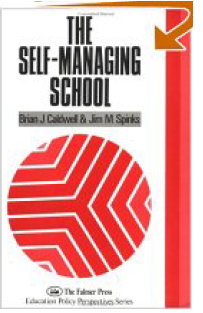Brian Caldwell and Jim Spinks are proponents of the idea of a ‘self-managing school’. Here, Caldwell and Spinks describe a self-managing school.

We define a self-managing school as one for which there has been significant and consistent decentralization to the school level of authority to make decisions related to the allocation of resources …
The township of Rosebery is located on the west coast of Tasmania. The town has developed in conjunction with the mining industry. The school of some 600 students serves not only Rosebery but also the neighbouring Hydro-Electric Commission village of Tullah and the mining town of Zeehan. The school is referred to as a K-10 school as students are enrolled at the age of four years in kindergarten and continue through until fourth year of high school, year 10 …
At Rosebery there was no conscious decision to adopt or implement Collaborative limate is wet and cold. These factors, together with the problems of overcrowding in the school and in teachers’ residences and hostels, meant that the school suffered a very high turnover of teachers. Consequently, the school was unable to carefully plan courses that were always best suited to students. The curriculum content, of necessity, often reflected the background and experiences of staff rather than the needs of students …
The third major concern related more to how the school operated as a part of the state system rather than to local problems. Circumstances dictated that systematic planning was impossible because the school never knew early enough, or at one particular time, what resources would be available in any one year. Staff were always being required to plan for some particular quantity and type of resources without knowing the whole situation … [P]lanning for resources tended to be ‘spending’ instead of developing plans related to policies and identifying the resources those plans would require. It was also evident that this piecemeal approach to planning and budgeting was not only less than totally effective but an inefficient use of staff time.
In addressing these concerns a collaborative management style was development which is now well established. This has enabled the development of clear, concise policy statements on important issues, including the curriculum. These policies are developed by collaboration of the staff and school community, thus ensuring relevance and commitment. These policies provide the school staff with a framework for programme planning which leads to the identification of the resources required within programmes. This information forms the basis for the school budget which is then approved by the council if it considers that the budget reflects established policies and priorities …
The Process at Work at Rosebery:
POLICY-MAKING
- The council makes policies on substantive issues including areas of the curriculum.
- The council makes policies based on the goals, needs and philosophy of the school.
- The council passes policies to the head teacher (principal) and staff for implementation.
PLANNING
The head teacher and staff plan to implement policies by:
- Determining projected enrolments;
- Identifying an structuring programmes through which policies can be implemented;
- Identifying and estimating resource revenue;
- Preparing proposed programme plans and identifying the resources required to implement those plans.
BUDGETING
The head teacher and staff prepare budget by:
- Identifying resources required in programmes and estimating their cost;
- Drawing up summaries of proposed programme budgets for comparison purposes;
- Balancing proposed budgets with estimated resource revenue;
The council approves programme plans and budgets if they accurately reflect policies and priorities.
IMPLEMENTING
- The approved programmes provide the educational plan for the school.
- The programmes are implemented within the school through learning and teaching.
- The implementation of programmes is the responsibility of the head teacher and staff.
- Implementations also involve ordering and accounting.
EVALUATING
- The council and the head teacher and staff jointly share the task of evaluating programmes.
- Programs are evaluated with respect o effectiveness and efficacy.
- Information is provided on which to bases decisions concerning future developments to further improve outcomes and experiences for students.
Caldwell, Brian J. and Jim M. Spinks. 1988. The Self-Managing School. London: Falmer Press. pp. 5, 71, 88.
|| Amazon || WorldCat
